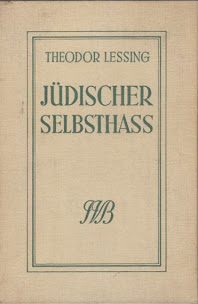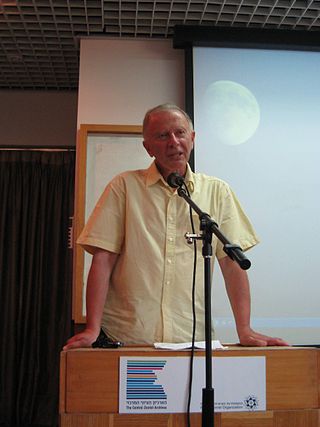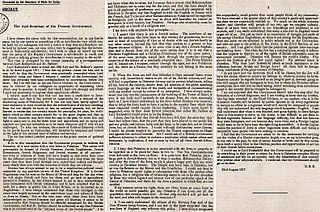Related Research Articles
A number of organizations and academics consider the Nation of Islam (NOI) to be antisemitic. The NOI has engaged in Holocaust denial, and exaggerates the role of Jews in the African slave trade; mainstream historians, such as Saul S. Friedman, have said Jews had a negligible role. The NOI has repeatedly rejected charges made against it as false and politically motivated.
New antisemitism is the concept that a new form of antisemitism which developed in the late 20th and early 21st centuries, tends to manifest itself as anti-Zionism and criticism of the Israeli government. The concept is included in some definitions of antisemitism, such as the working definition of antisemitism and the 3D test of antisemitism. The concept dates to the early 1970s, although the identification of anti-Zionism with antisemitism has "long been de rigueur in Jewish communal and broader pro-Israel circles".

The terms "self-hating Jew", "self-loathing Jew" and auto-antisemite are pejorative terms used to describe a Jew whose viewpoints on any specific matter are perceived as antisemitic.

Robert Solomon Wistrich was a scholar of antisemitism, considered one of the world's foremost authorities on antisemitism.

Anti-Zionism is opposition to Zionism. Although anti-Zionism is a heterogeneous phenomenon, all its proponents agree that the creation of the modern State of Israel, and the movement to create a sovereign Jewish state in the region of Palestine—the biblical Land of Israel—was flawed or unjust in some way. Anti-Zionism includes, for example, criticism of the current policies of the state of Israel as well as moral, ethical, or religious criticism of the idea of a Jewish nation-state, in contrast to a secular state.
Antony Lerman is a British writer who specialises in the study of antisemitism, the Israeli–Palestinian conflict, multiculturalism, and the place of religion in society. From 2006 to early 2009, he was Director of the Institute for Jewish Policy Research, a think tank on issues affecting Jewish communities in Europe. From December 1999 to 2006, he was Chief Executive of the Hanadiv Charitable Foundation, renamed the Rothschild Foundation Europe in 2007. He is a founding member of the Jewish Forum for Justice and Human Rights, and a former editor of Patterns of Prejudice, a quarterly academic journal focusing on the sociology of race and ethnicity.
Formed in March 2009, the Canadian Parliamentary Coalition to Combat Antisemitism (CPCCA) was a group of Canadian parliamentarians organized for the stated purpose of confronting and combating antisemitism in Canada. In particular, the CPCCA focused on what it calls the "new antisemitism," which it saw as the revival of classically antisemitic beliefs in the guise of anti-Zionism.

Criticism of Israel is a subject of journalistic and scholarly commentary and research within the scope of international relations theory, expressed in terms of political science. Israel has faced international criticism since its declaration of independence in 1948 relating to a variety of issues, many of which are centered around human rights violations in its occupation of the West Bank and the Gaza Strip.
Antisemitism in Russia is expressed in acts of hostility against Jews in Russia and the promotion of antisemitic views in the Russian Federation. This article covers the events since the dissolution of the Soviet Union. Previous time periods are covered in the articles Antisemitism in the Russian Empire and Antisemitism in the Soviet Union.
The "three Ds" or the "3D test" of antisemitism is a set of criteria formulated by Israeli human rights advocate and politician Natan Sharansky in order to distinguish legitimate criticism of Israel from antisemitism. The three Ds stand for delegitimization, demonization, and double standards, each of which, according to the test, indicates antisemitism.
Since World War II, antisemitic prejudice in Italy has seldom taken on aggressive forms.
Antisemitism in contemporary Hungary principally takes the form of negative stereotypes relating to Jews, although historically it manifested itself more violently. Studies show antisemitism has become more prevalent since the fall of Communism, particularly among the younger generations. Surveys performed from 2009 and beyond have consistently found high levels of antisemitic feelings amongst the general population.
Antisemitism in the United Kingdom signifies hatred of and discrimination against Jews in the United Kingdom. Discrimination and hostility against the community since its establishment in 1070 resulted in a series of massacres on several occasions and their expulsion from the country in 1290. They were readmitted by Oliver Cromwell in 1655.
Antisemitism in Spain is the expression through words or actions of an ideology of hatred towards Jews on Spanish soil.
Trials of the Diaspora: A History of Anti-Semitism in England is a 2010 book by British lawyer Anthony Julius. The book details the role played by antisemitism in the history of the United Kingdom. The book argues that British anti-Zionism developed out of antisemitism in the United Kingdom and utilizes many of the same antisemitic tropes in its arguments.

Jewish Voice for Labour (JVL) is a British organisation formed in 2017 for Jewish members of the Labour Party. Its aims include a commitment "to strengthen the party in its opposition to all forms of racism, including anti-Semitism ... to uphold the right of supporters of justice for Palestinians to engage in solidarity activities", and "to oppose attempts to widen the definition of antisemitism beyond its meaning of hostility towards, or discrimination against, Jews as Jews".
The working definition of antisemitism, also called the International Holocaust Remembrance Alliance definition of antisemitism or IHRA definition, is a non-legally binding statement on what antisemitism is, that reads: "Antisemitism is a certain perception of Jews, which may be expressed as hatred toward Jews. Rhetorical and physical manifestations of antisemitism are directed toward Jewish or non-Jewish individuals and/or their property, toward Jewish community institutions and religious facilities." Accompanying the working definition, but of disputed status, are 11 illustrative examples whose purpose is described as guiding the IHRA in its work, seven of which relate to criticism of the Israeli government. As such, pro-Israeli organizations have been advocates for the worldwide legal adoption of the definition.

Comparisons between Israel and Nazi Germany occur frequently in some veins of anti-Zionism in relation to the Israeli–Palestinian conflict. The legitimacy of these comparisons and their potential antisemitic nature is a matter of debate. Historically, figures like Arnold J. Toynbee have drawn parallels between Zionism and Nazism, a stance he maintained despite criticism. Scholar David Feldman suggests these comparisons are often rhetorical tools without specific antisemitic intent. The Anti-Defamation League (ADL) sees them as diminishing the Holocaust's significance.
Zionist antisemitism is the phenomenon in which individuals, groups, or governments support the Zionist movement and the State of Israel while simultaneously holding antisemitic views about Jews. In some cases, Zionism may be promoted for explicitly antisemitic reasons. The prevalence of antisemitism has been widely noted within the Christian Zionist movement, whose adherents may hold antisemitic beliefs about Jews while also supporting Zionism for eschatological reasons. Antisemitic right-wing nationalists, particularly in Europe and the United States, sometimes support the Zionist movement because they wish for Jews to be expelled, or for Jews to emigrate to Israel, or because they view Israel as a supremacist ethno-state to be admired and held up as a model for their own countries.
The weaponization of antisemitism, also described as the instrumentalization of antisemitism, is the use of the charge of antisemitism or the deployment of antisemitism and antisemitic sentiments.
References
- Igansky, Paul, and Sweiry, Abe, Understanding and Addressing the ‘Nazi Card' - Intervening Against Antisemitic Discourse, published by European Institute for the Study of Contemporary Antisemitism (EISCA), 2000, online. Cited as "EISCA Report".
- Lerman, Antony "Should we ban 'Nazi analogies'? Using Nazi analogies to criticise Israel or Zionism may be offensive, but should it be against the law?", in Guardian, 24 July 2009, online